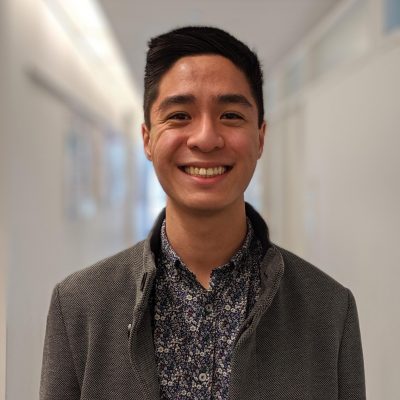Student Spotlight: Jason Chang

July 17, 2020
Jason Chang is a doctoral candidate in biomedical engineering from Plano, Texas. After earning his B.S. in biomedical engineering at the University of Texas at Dallas, he chose to pursue further study at Cornell for the research opportunities, support, and sense of community.
What is your area of research and why is it important?
There are approximately 4,000 tendons in the adult human body, all of which facilitate everyday activities such as locomotion, exercise, lifting heavy objects, and even blinking. Tendon injuries are debilitating conditions that heal poorly with the formation of mechanically inferior scar tissue. Despite tendon injuries accounting for nearly a third of all musculoskeletal consultations, current clinical treatments (e.g. surgical reconstruction) fail to restore pre-injury function and exhibit high post-operative re-injury rates. Accordingly, my research under Prof. Nelly Andarawis-Puri aims to understand the biological mechanisms underlying mammalian tendon regeneration.
What are the larger implications of this research?
This research will enable the development of more effective therapeutics that promote “scarless” tendon healing, including improved tendon tissue engineering strategies and/or biological augmentation strategies to minimize the need for surgical intervention.
What inspired you to choose this field of study?
As a high school senior, I knew that I was broadly interested in engineering. I continually flip-flopped between different prospective majors until I read a press release featuring Cornell BME’s own Prof. Larry Bonassar. The article showcased his group’s research that developed 3D-printed human ears. The exciting and multidisciplinary nature of biomedical engineering quickly drew me in. Four years later, I found myself sharing this story with the one and only Prof. Bonassar during my Ph.D. recruitment weekend. A huge full-circle moment!
What were your research plans before the pandemic and how did you pivot to accommodate the current circumstances while still making degree progress?
Before the pandemic, I spent months optimizing a device and collecting preliminary data to set the foundation for the remainder of my dissertation research. Unfortunately, the timing of the shutdown impacted the feasibility of this work and required me to redirect my next steps. It was an extremely hard decision to let go of those exciting ideas that I had in the works for almost a year, but I also recognized that it was necessary to adapt to these new extenuating circumstances. I spent most of March through May focused on non-research activities, including TA’ing, mentoring and supporting my undergraduates, and spending time with my partner. Ultimately, it was a much-needed breather taking a step back and re-considering the big picture of my research instead of being inundated with the specifics of my experimental design. At a certain point, it was no longer productive to constantly worry about the what-ifs and uncertainties until we received official guidance from the university on research reactivation. Of course, it also helped tremendously that my advisor, lab mates, and colleagues have been nothing but empathetic and supportive during these trying times.
How have the past several months changed your outlook on working on campus, especially now that you are able to return to your lab?
These past several months have been an important reminder for me to actively recognize the incredible privilege that I have as someone who lives on-campus (as a Graduate Resident Fellow in West Campus). Transportation to/from my research building is not a barrier to my work, so I consciously made sure to be as flexible as possible when coordinating research shifts with my lab mates. With many of our research core facilities also re-opening to accommodate our work, it has definitely put a lot into perspective and made me more appreciative of the environment at Cornell. In addition, the overwhelming support and continued communication that I’ve received from the Cornell Office for Inclusion and Student Engagement (OISE) and my field has made the transition back to on-campus work much more bearable, especially in light of the rampant anti-Black racism and xenophobia impacting many individuals in our community at this time.
What are your hobbies or interests outside of your research or scholarship?
Outside of the lab and work, I enjoy cooking (my air fryer and Instant Pot have kept me sane), baking, and exploring new restaurants/coffee varieties. Before the pandemic, I was also an avid rock climber at Lindseth.
Why did you choose Cornell to pursue your degree?
When I first arrived at Cornell, I came alone instead of on the main Ph.D. recruitment weekend due to a conflict with another Ph.D. visitation. Despite being the only prospective student visiting that weekend, the administrative staff, faculty, and current students pulled out all the stops to ensure that I felt at home—I could immediately feel the overwhelming support and strong sense of community within Cornell BME. I never felt at any point that people were putting on a superficial front or overselling the program. In fact, the students I met with openly discussed their challenges and areas for improvement, and all the faculty genuinely focused on helping me make an informed decision for the next step of my career. At some point during my visit weekend, I realized that the Cornell BME Ph.D. program and the institution as a whole offered me more than just exceptional preparation for a successful scientific career. Cornell actively fosters an environment that encourages its graduate students to extend their training beyond the research lab (e.g. outreach, teaching, mentoring, and science communication and policy opportunities) which I knew would allow me to grow tremendously as a scholar and future educator—and so I committed to the program before I even got on the plane back home!
